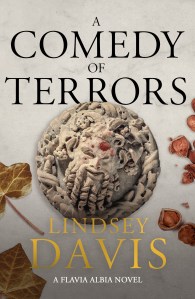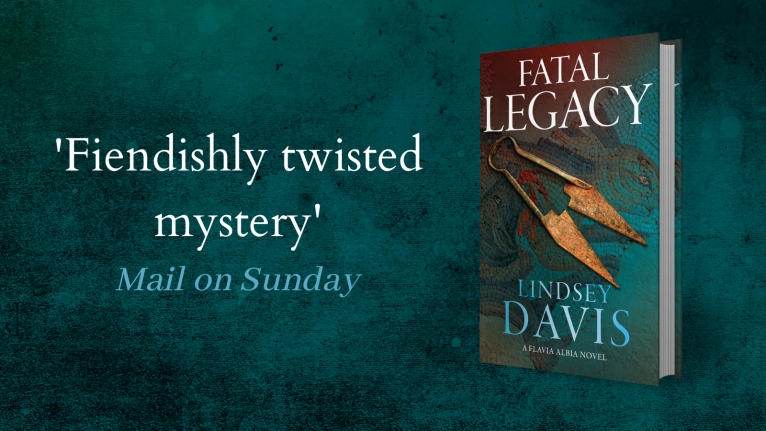Read an extract from A Comedy of Terrors by Lindsey Davis

We can’t wait for the return of Private Investigator Flavia Albia in Lindsey Davis’ gripping and witty new murder mystery set in Ancient Rome, A Comedy of Terrors. Read on for a sneak-peek extract from the first two chapters:
1
Io! Saturnalia: the year when we acquired the boys. People kept telling my husband, ‘Well, this will put an end to that work of hers!’ Tiberius only smiled ruefully. I stopped bothering to argue: I would continue to be a private informer because I refused to be doomed by parenthood.
The killjoys kept trying to depress us: ‘And of course,’ they gloated happily, ‘Saturnalia will be so difficult for you!’
Idiots. Life would certainly hold challenges for our two nephews. From now on every December, the month when their mother died, would be sad. All of us would feel it. Tiberius would never stop grieving for his lost sister; he was that kind of man. But you cannot ignore Saturnalia, not when everyone around is heartlessly throwing themselves into the riot and, because we lived on the Aventine, the caterwauling public were keeping our two tots awake every night. Gaius and Lucius were country-born. They knew how to ignore endlessly crowing cockerels or even yokels shrieking over snail races. But the city racket of the great December holiday disturbed them. Then they whimpered into their pillows. We tried to comfort them, but they were just little boys who thought they were going to miss all the presents, jokes, cakes, and parties with ghost stories.
We were treading a fine line in sensitivity, but we handled it as best we could. Tiberius was still grieving for his sister Fania, but we wouldn’t keep these two stuck at home as if they could never have any fun again.
The other stupidity I had to endure was people assuming that I – that well-known piece of work, Flavia Albia – would have no idea how to look after the boys. Cobnuts. For a start, I knew how they were feeling because I had been an abandoned child myself, somehow lost by my birth parents in the Boudiccan Revolt in Britain. Later, when I was adopted by Falco and Helena, I too had discovered what it was like to arrive in Rome, this huge overwhelming city, and to find yourself stuck among clamorous new relatives who were not always welcoming. Even fifteen years later I felt like an outsider, though it hardly mattered since Rome was stuffed with incomers. There were more of us than them.
‘How will you cope, Albia? You’ll really have your hands full now!’
Oh, leave me alone. I was ready. When I came to Rome, I had had baby sisters, then later a brother. I do know how to blow a small snotty nose on a child who is wildly struggling to escape. I had a fair idea how to set a daily routine. We were not trying alphabet lessons yet, but when we did, I would teach them myself; we already had a set of letters because I was making our slave, Dromo, learn. In his case it was tortuous, but by the time he was ready for freedom, he would be able to run his own business. So, these two little boys would survive, if it was up to me.
Gaius and Lucius had now been here for three days. They were tentatively joining in Saturnalia; if they decided to hide away and cry instead, we found them, gently bringing them back for cuddles. We made sure they knew that, even though their loving mother was no longer here, there would be new toys. As reassurance, I had promised to take them out to buy horrible little figurines that they could give to members of our household and a few people they had decided they liked. That included my parents and sisters, though not my brother Postumus, who had scared the boys at our wedding (most people find him scary), nor Uncle Tullius, who openly loathed children.
I had to learn quickly. I shared a laugh with my own dear mama about having to provide gift-figurines secretly for Postumus and Tullius so they didn’t take offence. Helena Justina was no help. Though a lovely woman in many ways, she said she had done enough of this in her time (and still had three at home, plus Father); she would just sit back and enjoy watching me go through it.
However, she did tell me which sigillaria-seller could be trusted with small boys: an African street hawker called Agemathus. And she warned me to choose pottery figurines, because wax ones would melt in their hot little hands when they played with them before handing them over as presents.
‘Even though you explain they shouldn’t, because the statues are meant for other people?’
‘Oh, yes. Postumus innocently claims he is testing for hidden weaknesses, which would disappoint his recipients.’
‘He knows. Some sigillaria hardly last a week, Mama.’
‘They are made with flaws on purpose, Albia. The hawkers want you to buy new ones every year. No hiding them at the back of a cupboard for next time.’
‘Next time?’ Glumly, I faced the fact that I was trapped. Saturnalia stress was mine for ever: the matron in a household has to make the festival run smoothly. You cannot rely on the paterfamilias because he is probably drunk.
Who can blame him? asked my mother. She would be drunk herself, she said, only somebody has to be capable of counting the wheat-cakes. You can’t run out to buy more; it’s a holiday so the bakery is closed and all the street-sellers have vanished. I had a steward to monitor supplies, but Helena warned me Gratus might be tipsy too.
Even so, since the parents were holding a traditional family feast, she wanted to borrow him to help. Also, since my cook had once worked in a celebrity restaurant, she asked very sweetly, could Fornix send a batch of his wonderful cakes? Not too much cinnamon because it made Postumus sneeze.
‘Anything else?’ I groaned.
‘You will have to find the boys a nurse, if you want to keep working.’
My mother must be the only person in Rome who assumed I would never give up. Neither of us realised how soon this would be tested.
I duly took Gaius and Lucius to buy sigillaria. We found the street where the recommended figurine-seller was supposed to lurk. Agemathus was nowhere to be seen.
Locals claimed the man with the tray had been around all morning, yet no one could say where he had wandered off to or when he might stroll back. If he had been lured to a bar in full festival swing, he might only surface tomorrow. The boys were becoming fretful. In the end someone told me where he lived. Needless to say, his cold hutch was a meagre room in a dark tenement off a back alley behind a street of sponge-sellers, though believe me, it was not clean.
The building where we were now having our adventure rose to about six storeys, as high as regulations permit. It seemed to consist of one-room lettings from ground floor to attic, with no superior apartments lower down and no exterior streetside shops. Agemathus lived on the third floor. I homed in because he had fixed a figurine to his doorpost to advertise. I couldn’t believe many people would see this by chance; already I was starting to fear the statue-seller might be scattier than Mother had promised.
Clutching the children’s sticky hands, I barged into his accommodation. He was in the room, lying face down on the bed. His tray of ghastly statuettes was there too, on a wonky stool: odd little men, who might have been religious in origin. A woman with no conscience might simply have snaffled a handful for free but to reach them I would have to pass close by Agemathus. Even I shrank from that. He had clearly not passed out from festival excess: blood was soaking the back of his tunic and a knife had been plunged between his shoulder-blades.
‘Oh dear!’
Oh, pigshit. And you try telling a three-year-old and a five-year-old who have been promised horrible figurines that now they can’t have them.
2
For me, as a private informer, this was a familiar situation. I always seem to be stumbling upon suspicious deaths, and since I don’t trust the vigiles to investigate, I often knuckle down to it myself. A woman’s work is never done. I cannot abide mess and, besides, I specialise in solving problems. I have even had clients who were snuffed out by some enemy after they hired me – though more likely I would find out my client had ignored my advice and taken rash action against someone else. Many of my commissions are family affairs. People in trouble do love to snap and go for one another. As a professional, I have to warn against murder as a remedy but, let’s be honest, it can be a neat solution.
The first arrival at a crime scene should carry out certain key actions. First you must stop any hysterical spouse flinging him- or herself upon the corpse in real or fake grief. Don’t stand for that nonsense. Assume that they did it, until proved otherwise. The more they act up, the more certain their guilt.
Next, remove very young children. Just shove them out. It is generally assumed the sight of blood will work upon their tiny minds in a bad way. You are supposed to rescue them from that. Later, you can give them honeyed figs and interrogate them cruelly, just in case they saw anything useful.
Mine were being pretty cool about Agemathus. Coming from the countryside, full of animals being slaughtered, must have made them blasé. Also, they seemed to regard the soaking blood as a Saturnalia jape. I managed to grab them by their tunic-necks before they could run to the figurines. Thwarted, they screwed up their eyes ready for tantrums. Gaius, the five-year-old, could go red in the face at will. Lucius, aged three, watched carefully then tried to copy him.
I would have to take them home. I had automatically fired up my forensic mode, assessing the death scene and looking around for clues. I could not be distracted, not while I was conducting an examination.
Grasping their little hands again, I led them from the room. I pulled the door closed after us as best I could, though it did not fit properly and had no latch. I had got in originally by leaning on it. Had that nailed-up figurine outside helped a murderer find Agemathus?
We clattered back down two flights of a stone staircase, past the usual stinking dolium of collected urine that stood in the filthy entrance lobby – ‘Oh, pooh-ee!’ and ‘Why isn’t there one of those at your house, Albia?’ – into the comparatively fresher air outside. I paused on the threshold, wondering whether to alert anyone.
We had seen no door porter or watchful crone when we entered the tenement. It had sounded unoccupied then; it still did. I could tell that plenty of people lived here; their litter was everywhere. Something was sticking my shoe to the ground. At mid-morning the tenants must all be out working, women as well as men. Children would have been taken to grandparents, aunts or pittance-a-day minders. I doubted that any of them went to school, but the current term had already ended for the holiday.
No one in these suffocating little rooms would own slaves. Conceivably, some were runaway slaves themselves. If so, they too had gone out to beg. The Aventine was crowned with ancient temples, whose high flights of steps were sought-after pitches. My father says a cartel controls them, charging beggars a premium to sit in prime spots, even if they are genuinely blind, lame or have no arms and must hold a money-cup in their teeth. He’s a gloomy theorist. Falco thinks everyone is crooked. I don’t bother thinking it: I know.
This tenement was the only building on a short dark alley, with a blank wall opposite. The alley was a stub off a small crossroads piazza to which we now walked. It contained a fountain – not large, no flowing river-god statuary, just a lead pipe that dribbled sluggishly into a stone basin. Basic. Still, it was adequate. If the pipe was kept hygienic, the water would be drinkable. Fresh water came to Rome from distant hills, with very clean sludge in it and hardly any live wriggly things.
Now, as when I arrived, the piazza was filled with local slaves, one or two already wearing their Saturnalia liberty caps. They were loafing about while queuing for the fountain. Most homes on the Aventine did not possess a water supply. The Aqua Appia runs around the hill too low down for us, but higher up, a newer branch was called the Aqua Marcia, to which wealthy houses could be joined with imperial permission (you threw cash at a palace freedman, as Tiberius and I had recently done for our home). Poor people used wells. Most wells are horrible.
Where public fountains like this were run off the Aqua Marcia, householders who owned slaves could send them out with buckets. This carried risks. Every slave in Rome knew that a water fountain was their best chance to loiter, pick fights, pinch food, make noise and harass women, before dawdling home, slopping as much as possible out of their pails so they would have to be sent out again.
Four or five such characters were nattering and nudging each other. One had stuck a chipped urn under the pipe, although he was paying no attention to it. The way they sniggered together when we reappeared convinced me they had seen me go into the tenement with children, guessed why, and already knew what I was going to find in Agemathus’s room. Somehow, they had learned there was a corpse. They were all waiting for me to return looking shocked.
There were too many of them for me to tackle, especially while I had the boys with me. I could see they were incipient trouble-makers. They probably came from different houses, but they all knew each other and seemed ready to gang up on a woman they outnumbered. It’s best not to approach slaves like that. I made mental notes of their faces, then played deaf to the lewd comments that inevitably followed as we walked off. Low-grade slaves can be bad enough normally, but Saturnalia was giving them extra licence.
At least hauling Gaius and Lucius home gave me time to think about how to deal with what we had seen.
Tell your husband, Albia.
Oh, yes? Let a man take over? You cannot be talking to me!
At our house, my husband of four months was sitting in the courtyard with a familiar figure. They were silent, as if pondering something together. It was making them glum.
‘Io, Morellus! How handy to find you here. I need a man from the vigiles, even a useless one.’
‘We saw a dead body! It was horrible!’ chorused the two boys, in brief excitement. They scampered off to stare at our new donkey. She stared back. Dromo, our slave, was astride her tail end, solemnly pretending to be riding along; he was about sixteen, with a behaviour age of seven. The donkey, Mercury, stood beside a pergola, eating a creeper. She was two but acted older; I had been promised she was steady-paced and sensible. Well, she was tolerating Dromo.
Yes, I know Mercury is a male god, but she came to us ready-named by someone who cannot have been pedantic. The boys called her Merky because they couldn’t say her real name. She had no stable yet, which was one of multiple tasks that someone had to tackle around here. Instead, my husband was letting himself be distracted by Titus Morellus.
Our visitor was a podgy, shaven-headed brute in a limp red tunic, who passed for the local vigiles cohort’s investigator. He was lazy and coarse, but if your house was broken into, your slave robbed in the street or your daughter raped, he would be the best on offer. Unless you hired me, Morellus was the only resource available.
Completely ignoring mention of a dead man, he reared off his stool with a joyous cry. ‘Flavia Albia! Come here for a big Saturnalia hug!’
‘Get lost! I am not going to be groped in my own home.’ I could have added, ‘With my husband watching,’ but he could stand up for himself. Tiberius merely smiled. ‘Titus Morellus, Gaius and Lucius are right. I took them to buy figurines, but we found the man knifed in his room.’
Morellus winced as he slumped back onto his stool. ‘Ouch.’
He now deigned to acknowledge the information, though without enthusiasm. ‘Who was it?’
‘Agemathus.’
‘Do I know him?’
‘Only you can say, Morellus. Tall. Thin. African. Has touted sigillaria for years.’
‘On the Armilustri? Yes, he’s a regular. His brother must have done for him. Couple of pranksters, always vying to outdo each other with tricks, deadly competitive. It was bound to go too far one day.’
‘Will you investigate?’
‘No fear.’
‘Oh, Morellus!’
‘If somebody comes moaning to the stationhouse, I’ll have to open a file I suppose, but I don’t have time, Albia. I can’t investigate every idiot whose festive treat is being stabbed by a family member. Families! Who needs them?’ Morellus sailed into a practised complaint. ‘Rome’s a madhouse, and we haven’t even reached the main day. I’ve had three grievous batterings already – two involving women who’d been on the drink all afternoon. Once the men are let off work for the week, the fights will really start. I’ll be run ragged.’
‘I see you are suffering already!’ I sat on the bench beside Tiberius, then pointedly indicated piles of nuts they had lined up on a low table in front of them. ‘Clearly you pair have had your feet up here all morning, making yourselves sick with snacks before the holiday even starts.’
‘Work!’ claimed Morellus.
‘Lies.’
‘Retail quality control,’ Tiberius specified. To demonstrate, he tossed up an almond, caught it in his mouth and chewed.
He was in his last few weeks as an aedile, one of the magistrates responsible for testing market weights.
‘Some short-changing stall-holder?’ Although it sounded plausible, I was sceptical.
‘We think it’s a bit more than that.’ He was often cagey, wanting to be sure of his facts, yet this sounded like Don’t worry your little head about men’s business, lady. I expected that from Morellus, though not Tiberius.
I could have slapped them down but I had a more important preoccupation. ‘Never mind minor pistachio-diddling. Let’s decide what is to be done about this sigillaria-seller who’s had a dagger plunged into him.’
‘Oh, I’m going to wait until I’m asked,’ Morellus assured me again lazily, while Tiberius just took another nut from a bowl. ‘Or else, since it was you who discovered the corpse, you could write up a witness report, like a concerned neighbour, Flavia? Hand it in nicely, so my clerk can file it somewhere dark?’
I was surprised. The murder was interesting. Usually they would snatch a puzzle like this away from me. ‘Not my job. I work on commission, Morellus.’
‘No funds for it.’
‘Someone has to pay me fees. That’s business – plus, in case you haven’t noticed, we have a family to keep now.’
Morellus cast a rheumy eye at Gaius and Lucius, who had scrambled up our new fountain bowl and climbed onto Merky with Dromo, pulling at the donkey’s long ears. ‘Stop that, or he’ll bite you.’
‘She,’ I classified. Morellus gave me his ‘It would be!’ glare.
‘If you like,’ offered the vigilis, suddenly, ‘I’ll take your nippers home to play with mine.’
I could never remember whether he and his rather nice wife had three or four children. It surprised me that Morellus himself kept track, though he did, because he said proudly, ‘Our babby’s walking now!’ He made it sound as if he had brought about this feat, though I knew it would have been Pullia who did all the dandling and encouraging.
We needed distractions for the boys. Morellus must have been told their situation. Tiberius smiled thanks. I was more cautious: the Morelli were confident young characters who were bound to know all the latest terrible toys and jokes. Even the babby had probably got her chubby hands on a brand-new pig rattle, some model never seen in Rome before.
‘That would be very good for them. Spare a man to go and register the Agemathus fatality, Morellus.’
‘No chance, Flavia darling!’
‘Don’t call me “darling” – and I’ve told you enough times, don’t call me Flavia!’
I could have left this alone, but I grabbed my note-tablets. ‘All right. I’m not taking on unpaid enquiries, but I’ll document the scene like a responsible witness. You munch your nuts. I’ll go back there myself!’
As I stormed off to show Morellus the responsible way to register a Saturnalia killing, I heard Tiberius say darkly that nuts were not what they used to be.







